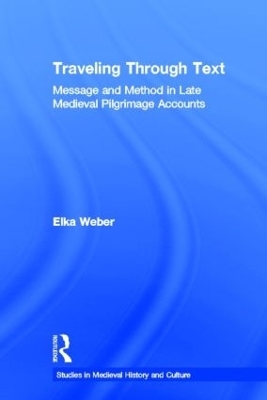
Traveling Through Text
Message and Method in Late Medieval Pilgrimage Accounts
Seiten
2005
Routledge (Verlag)
978-0-415-97577-3 (ISBN)
Routledge (Verlag)
978-0-415-97577-3 (ISBN)
Comparing the travel writing of Muslims, Christians and Jews in the later Middle Ages, this book presents insights into how these religious communities shaped the perceptions of their readers. This book also explores the tensions between text and empirical experience as found in the writings of religious writers who value holy texts.
Traveling through Text compares religious ravel writing by Muslims, Christians and Jews in later Middle Ages. This comparative approach allows us to see that writers in all three religious communities used travel writing in the same way, to shape the perceptions of their readers by asserting the author's authority. The central paradox of religious travel writing is that the travel writer reads about a place, usually in a sacred text, decide to supplement the reading with the empirical experience of visiting and describing the place, and the creates his own descriptive text. But in writing this new book, and in letting his readers know his authorial authority, the travel writer himself is daring the reader to challenge the new text. Is a book ever enough? For societies that value their sacred texts, this question is a challenge. But it is a challenge posed by writers who live firmly in the religious tradition.
Traveling through Text compares religious ravel writing by Muslims, Christians and Jews in later Middle Ages. This comparative approach allows us to see that writers in all three religious communities used travel writing in the same way, to shape the perceptions of their readers by asserting the author's authority. The central paradox of religious travel writing is that the travel writer reads about a place, usually in a sacred text, decide to supplement the reading with the empirical experience of visiting and describing the place, and the creates his own descriptive text. But in writing this new book, and in letting his readers know his authorial authority, the travel writer himself is daring the reader to challenge the new text. Is a book ever enough? For societies that value their sacred texts, this question is a challenge. But it is a challenge posed by writers who live firmly in the religious tradition.
A graduate of New York University's Department of Middle Eastern Studies, Elka Weber has taught at a number of universities. She is currently researching travel and notions of place in the writings of medieval Jews. She recently contributed a chapter, Sharing the Sites:Medieval Jewish Travelers to the Land of Israel to Rosamund Allen, ed, Eastward Bound: travel and travellers1050-1550, , 2004.
1. Place 2. Text 3. Relationship 4. Alienation 5. Sacred Sit
| Erscheint lt. Verlag | 14.10.2005 |
|---|---|
| Reihe/Serie | Studies in Medieval History and Culture |
| Verlagsort | London |
| Sprache | englisch |
| Maße | 152 x 229 mm |
| Gewicht | 430 g |
| Themenwelt | Geisteswissenschaften ► Sprach- / Literaturwissenschaft ► Anglistik / Amerikanistik |
| Geisteswissenschaften ► Sprach- / Literaturwissenschaft ► Literaturwissenschaft | |
| ISBN-10 | 0-415-97577-8 / 0415975778 |
| ISBN-13 | 978-0-415-97577-3 / 9780415975773 |
| Zustand | Neuware |
| Haben Sie eine Frage zum Produkt? |
Mehr entdecken
aus dem Bereich
aus dem Bereich
Poetik eines sozialen Urteils
Buch | Hardcover (2023)
De Gruyter (Verlag)
59,95 €
Entzauberung und Faszination des Immergleichen in Literatur und Film
Buch | Softcover (2024)
Springer Fachmedien Wiesbaden GmbH (Verlag)
84,99 €
Buch | Softcover (2024)
belleville (Verlag)
20,00 €


